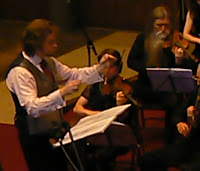Update: Current Virtuoso Violinists
I'm not sure this list will ever be complete, but I will endeavor to continue to update when I find a violinist worthy to be called Virtuoso and performing on the world stage. Sarah Chang (pictured) is a Korean-American violinist, born in Philadelphia to Korean parents, she recorded her first album at 9 . While I find her playing a bit overly sentimental, the pieces I've heard her play are Dvorák and Sibelius which both tend to the sentimental category, so I don't think what I've seen is representative of her ability. She's certainly won plenty of awards. Here she is playing Dvorák's Violin Concerto . Anne Akiko Meyers (pictured) performed with the Los Angeles Philharmonic at age 11. (good grief, all these child prodigies). Her debut album was of the Samuel Barber and Max Bruch concertos, not a small feat. Here she is playing the first part of the Barber Violin Concerto . Realizing my list is dominated by women I thought I should include some men of ...




